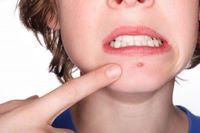- Home
- Acne Treatments
- Types of Acne

Types Of Acne
Identify the type of acne you have before you can effectively treat it.
There are so many acne treatments available simply because there are so many types of acne:
- Adult Acne – as the name implies occurs in adults and is often caused by imbalances in hormones.
- Acne Cosmetic and Acne Detergens – once again aptly named as these usually occur as a reaction to a cosmetic skin preparation or soap that has been applied to the skin.
- Acne Conglobata – is thankfully uncommon but can cause serious scarring on the face and back and it is usually associated with hereditary factors.
- Cystic Acne – These are large, painful bumps filled with pus that can form deep beneath the skin’s surface if left untreated for too long.
- Acne Excoriee – is associated with a psychological condition that causes sufferers to constantly pick at the pimples and spots.
- Acne Fulminans – is more commonly found in males. It is a severe form of acne accompanied by other symptoms that make it very debilitating and serious.
- Acne Inversa – a distressing form of acne, occurring in adults and affecting intimate parts of the body.
- Acne Keloidalis – occurs usually in those with darker skins and with stiffer hair type. It is an inflammation and scarring of the hair follicles.
- Acne Mallorca – thought to be induced by a mixture of heat, sunlight and sun creams.
- Acne Mechanica – caused by constant pressure of material against skin or chafing.
- Acne Medicamentosa – caused as a side effect of taking other medications.
- Acne Neonatorum – sometimes referred to as Milia and is a form of acne that affects infants.
- Acne Pomade – is found in those who use heavy oil preparations on their hair. The oil blocks the pores and causes a form of acne.
- Acne Rosacea – an adult form of acne that gives a distinctive red flush to the face
- Acne Vulgaris – is what people usually refer to as simply acne. This is the version that afflicts teenagers world over.
-
Blackheads - Blackheads are small bumps that appear on the skin, typically on the face, chest, back and shoulders. They appear black or dark due to exposure to air and contain tiny plugs of oil and dead skin cells. Blackheads form when hair follicles get clogged with excess sebum, dirt, bacteria or other debris. This causes them to become inflamed, which can lead to redness, swelling and irritation. The best way to treat blackheads is to keep your skin clean, use exfoliants regularly and use products that contain salicylic acid or benzoyl peroxide to help unclog pores and reduce inflammation.
- Whiteheads - Similar to blackheads except they remain under the surface of the skin which means they’re white in color. They form when pores become blocked with excess sebum, dirt or bacteria.

An Interesting Question on Types of Acne - Is Acne Mallorca the Same as Acne Vulgaris?
No, Acne Mallorca and Acne Vulgaris are not the same condition. While both conditions involve acne breakouts, they differ in terms of severity and cause. Acne vulgaris, also known as “common acne”, involves blackheads and whiteheads as well as pimples and cysts which can be mild to severe. This type of acne is caused by overproduction of oil and bacteria within the skin’s pores. On the other hand, Acne Mallorca is more severe than common acne and is characterized by red pimples and cysts on the face (as well as other areas such as shoulders, back or chest). It is typically associated with hormonal fluctuations but may have other underlying causes such as genetics or stress. As a result, it requires tailored treatments that are specific to each individual case.
Can a Detox Diet Cure My Type of Acne?
While eating a healthy, balanced diet and staying hydrated can be beneficial for skin health, there is no single "detox" diet or supplement that has been proven to effectively treat acne.
It's also important to note that many factors can contribute to the development of acne, including hormones, genetics, and skincare products. So, while a detox may be helpful for some people, it's unlikely to be a cure-all for acne.
What Will Make My Acne Worse?
As an acne sufferer, it's important to be aware of the various factors that can make your acne worse. Generally speaking, anything that increases oil production or triggers inflammation in the skin can worsen acne. Some of the most common triggers of acne flare-ups include stress, hormonal changes, certain medications, and certain skincare products.
Consulting a dermatologist before using any treatments or medications is always recommended so that your individual needs can be assessed and addressed effectively.It's important to know which type of acne you have so that it can be properly treated - so make sure you speak with your doctor or dermatologist if you're unsure!
Apple Cider Vinegar Acne Cure
Acne Treatments



New! Comments
Have your say about what you just read! Leave a comment in the box below.